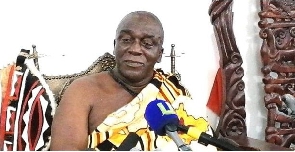 Nana Kobena Nketsia V, the Paramount Chief of Essikado traditional area
Nana Kobena Nketsia V, the Paramount Chief of Essikado traditional area
Nana Kobena Nketsia V, the Paramount Chief of Essikado traditional area, says the many scandals of corruption in the corridors of power could be attributed to the ineffectiveness of Parliament to demand serious accountability.
“If Ghana is corrupt, then Parliament is shirking its oversight responsibility,” the revered Chief said when he chaired a public forum organized in the Western Region as part of activities marking the 30th anniversary of the fourth Republican Parliament under the theme: “Thirty Years of Parliamentary Democracy under the Fourth Republic: The Journey Thus Far.”
He has, therefore, charged the members of parliament to act as true representative of the Ghanaian given the mandate to serve the interest of the generality of the people and not parties.
Nana Nketsia V was worried that the series of scandals had received little of no attention, adding, “Parliament must be up and doing and carefully probe into issues of corruption which continue to be a bane to our economic emancipation as a people “.
He queried, “how do you members of parliament approve loans and other bills in the house: do you really take time to read it, particularly on loans what is the motivation of just signing on to loan agreement when the country’s debt stock keeps increasing?…something is wrong somewhere and the earlier we sit back and revert the trends the better for all of us and not party colours.”
Mr Alban Sumana Bagbin, the Speaker of the Fourth Parliament, addressing the forum recalled in 1993 where Members of the first Parliament of the fourth Republic of Ghana were sworn into office in January 1993.
“I was among the 200 pioneers of Ghana’s fourth attempt at parliamentary democracy. During the referendum on the 1992 constitution, we all massively voted in support of constitutional rule and for the adoption of that constitution as a guide for our political superstructure and processes.”
The preceding work of the National Commission on Democracy (NCD) led by Justice D. F. Annan of blessed memory, the preference of Ghanaians for party politics and parliamentary democracy was clear.
The Provisional National Defence Council (PNDC) under the late Flt. Lt. Jerry John Rawlings as the Head of State, set up the NCD in 1984 to gauge the yearning of Ghanaians for a return to democracy.
The Speaker noted how the first group of parliamentarians of the Fourth Republic, who were the trailblazers of today’s parliament with little logistics, working tools and space, paved the way and found a path for the development and sustenance of parliamentary democracy in Ghana.
He described the stock-taking exercise as critical to consolidate the country’s democracy and deliver the dividends anticipated for constitutional rule.
“The truth is that with all the imperfections that we might associate with the current governance system, there is still no alternative that is better than what we have,” he added.
With the current happenings in the Sahel Regions, the most important thing was for all citizens to wake up to their civic responsibilities to protect and defend the constitution of Ghana as provided for in Article three therein.
The country, he educated was a product of three attempts at democratization and “the vision of the PNDC to establish what the leaders of the era referred to as “true democracy” and appreciated the work of the constitutional drafting Committee chaired by Nana Dr S. K. B. Asante producing a hybrid system of a blend of the traditional, Parliamentary and presidential systems of governance (of both the French and American models) as contained in the1992 Constitution.
Mr Bagbin, turning attention to the current parliament, described it as unique…a Parliament quite different from the earlier ones and unique in all its features.
He noted that the oversight function of Parliament, which hitherto, was the worst performer, had consequently improved slightly with a lot of light now being thrown on the dark side of governance earning the country the most open Parliament in Africa.
He added that towards a more relevant parliament was linked to the MP’s responsibility to the voter and called for sustained education in that direction.